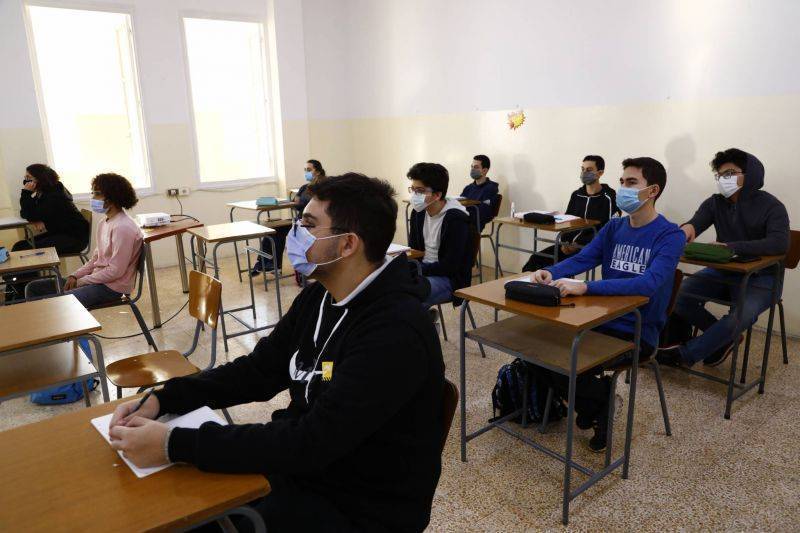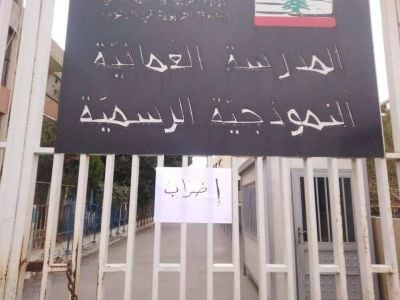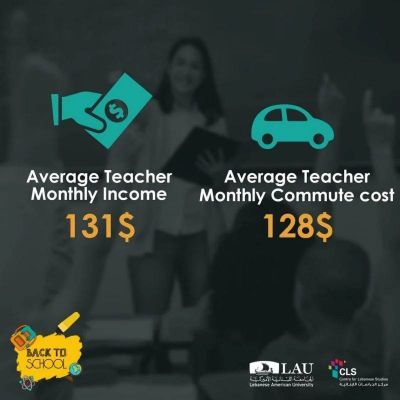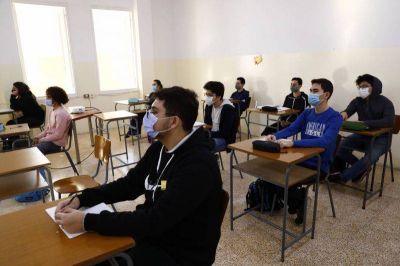
Lebanese students at the Collège du Sacré-Cœur in the Beirut neighborhood of Gemmayzeh. (Credit: Marc Fayad)
Their basic salaries should have been tripled, like those of public school teachers. They should have received aid in dollars, and their pension funds should have been adjusted. These three points are the basis of the agreement reached three weeks ago between the private schools teachers’ union and representatives of educational institutions.
But many teachers in the sector have never benefited from any salary adjustment, while the Lebanese lira continues to plummet, exceeding LL60,000 to the US dollar last week. Their syndicate therefore called for a strike today, Wednesday.
“The majority of the institutions have not respected the agreement reached. They have not increased the basic salary of their teachers, have not granted them any assistance in foreign currency and have yet to consider a solution to the devaluation of retirement allowance,” Nehme Mahfoud, president of the union, told L’Orient-Le Jour.
Percentage in dollars is too little
While prestigious institutions pay the teachers some of their basic salary in dollars, the proportion, they say, is far too little and does not solve the problem as a whole.
Teachers say they are exhausted by the slow dollarization of their salaries and the low remuneration granted. They also wonder why their basic salary has not been multiplied by three, according to the principle of concomitance between public and private education. Even when there was dialogue with the administrations of their institutions, the teachers’ frustration was not assuaged.
“We have had to dramatically reduce our standard of living. We receive 20 percent of our basic salary in dollars and the rest in Lebanese lira. This is better than many teachers, of course. But it is still too little, because we have to take into account the new taxes, the cost of gasoline, the high cost of living and the devaluation of the end-of-service allowances,” said two members of the teachers’ committee at the Grand Lycée Franco-Libanais, which voted for the strike.
The private school teachers are staging a one-day strike today. “It is a warning strike addressed on the one hand to the management of institutions, so that they respect the agreement reached, and on the other hand, to the government which must stop procrastinating and set the date of the meeting on education,” said Mahfoud.
This government meeting would focus on transport allowances, pensions and the rescue of the school year in both the public and private sectors. With their strike, private school teachers have joined the ranks of other people dissatisfied with their salary conditions this year. Public school employees have been on strike since Jan. 9. This movement is likely to grow and drag on if their demands on the adjustments and substantial transport allowances are not met.
Escalation, if our outcry is not heard
“If our outcry is not heard, we will consider escalation measures, in other words we will renew the strike,” Mahfoud warned.
The private school teachers’ strike sounds like a threat to the smooth running of the school year. After three particularly difficult years, marked by COVID-19 and the Aug. 4, 2020 explosion at the Beirut port, amid an unprecedented political and economic crisis, this year brings the three actors of the private education sector face to face: institutions, parents and teachers.
These three actors suffer equally from the collapse of the state, its services, and the country’s various vital sectors, including the banking and health sectors, and cannot find a miracle solution by themselves.
“We are facing a real catastrophe. Only the state can provide a solution,” said Sister Bassima Khoury, director of Antonine Sisters School in Roumieh.
“No matter how hard we try to find a solution, we can’t go on like this, nor can the teachers or parents,” she said.
With no banks to rely on, this school where middle-class students are enrolled waits for parents to pay tuition fees so as to be able to pay its teachers’ salaries and buy fuel and other equipment.
“The few dollars we give to teachers is no longer enough for them, because life has become so expensive,” the nun said.
For instance, in addition to the basic salary paid in Lebanese lira, the school provides a social assistance payment that varies between $150 and $350 per month per teacher, based on their seniority. But it has so far found no answer to the depreciated value of retirement allowances.
As for the tuition fees, they amount to about LL14 million per student, in addition to a sum of $300 per student, which decreases gradually for siblings.
“We are only in the fifth month of the school year. Already more than 70 percent of tuition fees are unpaid,” said Sister Bassima, who is faced with a dilemma. “What can we say to these families who do not receive fresh dollars?”
A harbinger of higher tuition fees
Families in this or any other school cannot afford new tuition increases, let alone in dollars. “We know that teachers’ salaries are worthless and that their demands are legitimate. But parents are in the same situation. Some of them don’t get any income in dollars. Like the teachers, they cannot afford fuel,” said Maya Geara, legal adviser to the union of private schools’ students parents’ committees.
They therefore believe that the strike is a means of pressure, to justify a higher percentage of school fees in fresh dollars. “The strike is staged at a time when educational institutions must submit their school budgets to the ministry. This is a harbinger of a new increase in school fees,” the unionist said.
All eyes are now focused on the caretaker education minister, who has called for a meeting involving all the components of the private education sector on Wednesday.
“I hope to be able to convince the schools’ representatives to pay the teachers their dues [in dollars], in cases where they have received fees in fresh dollars,” he told L’Orient-Le Jour.
Beyond the emergency, and the need to save the school year of all students nationwide, “it is the education sector as a whole that must be rethought today, while there is a lack of money and the teachers do not have enough money to pay for their transportation,” the minister said. “A ministerial meeting should be held on Thursday, under the chairmanship of caretaker Prime Minister Najib Mikati,” he added.
This article was originally published in French in L'Orient-Le Jour. Translation by Joelle El Khoury.


